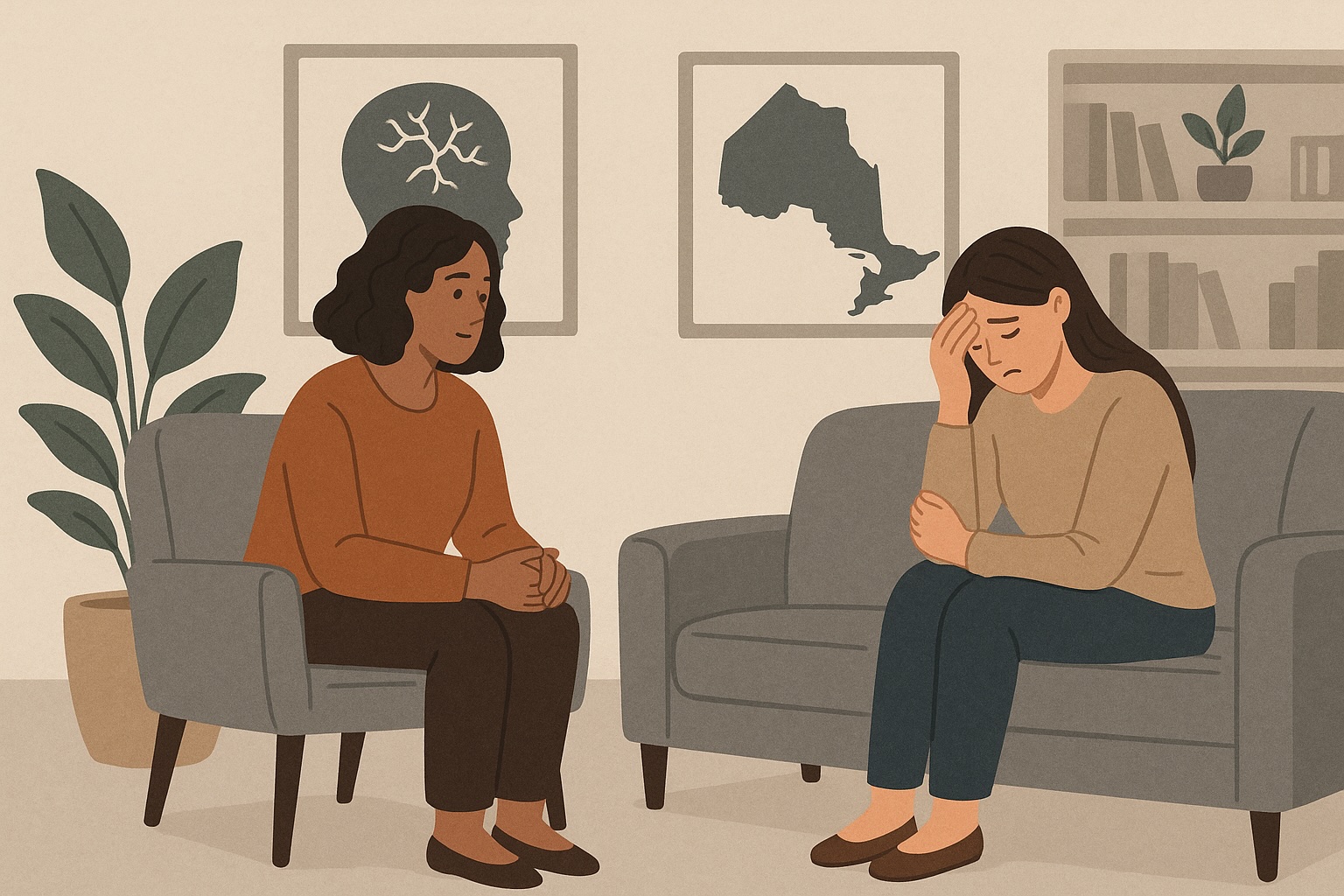Trauma-Informed Counselling Services for Domestic Violence Survivors in Ontario
Healing from abuse takes time. Trauma-informed counselling helps survivors of domestic violence in Ontario rebuild safety, trust, and self-worth—with support tailored to your experience.

Leaving an abusive relationship is just the beginning. **Trauma-informed counselling** can help survivors of domestic violence in Ontario process their experience, rebuild their mental health, and move forward in safety and strength.
***
### 🌿 What Is Trauma-Informed Counselling?
Trauma-informed counselling is a type of therapy that:
* Recognizes how trauma affects the brain, body, and emotions
* Prioritizes safety, trust, and empowerment
* Respects each survivor’s pace and boundaries
* Avoids re-traumatization by creating a supportive, non-judgmental space
* Often includes emotional regulation, grounding techniques, and psychoeducation
> It is especially helpful for survivors of intimate partner violence, childhood abuse, or coercive control.
***
### 🎯 Who Is It For?
Trauma-informed counselling is recommended for:
* Women, children, and men recovering from domestic violence
* Survivors experiencing anxiety, flashbacks, or nightmares
* People struggling with self-blame, guilt, or depression
* Anyone who has trouble feeling safe or trusting others after abuse
* Parents whose children were exposed to violence
***
### 🔍 Where to Find Trauma-Informed Counselling in Ontario
You can access services through:
* **Women’s shelters and sexual assault centres**
* **Community counselling agencies** like YWCA, Family Services, or CMHA
* **Ontario Health Teams and local public health units**
* **Culturally specific organizations** for newcomers, Indigenous, or LGBTQ+ survivors
* **Online therapy platforms** (some are free or low-cost)
***
### 💬 What Types of Support Are Offered?
Services may include:
* One-on-one counselling (in person, by phone, or online)
* Group therapy and peer support groups
* Short-term crisis counselling
* Long-term trauma therapy
* Children’s and youth counselling
* Art, music, or movement-based trauma healing options
> Most services are **free or subsidized** for survivors of domestic or sexual violence.
***
### 🧾 Do You Need a Referral?
Often **no referral is needed**. You can:
* Self-refer by calling the agency directly
* Ask your doctor, shelter worker, or legal support for help connecting
* Use 211 Ontario to find programs in your area
***
### 📌 Summary: Trauma-Informed Counselling in Ontario
* ✅ Designed to help survivors process abuse in a safe, empowering way
* ✅ Available through shelters, health centres, and nonprofits
* ✅ Offers individual and group therapy, often for free
* ✅ No referral needed in most cases
* ✅ Specialized services exist for children, immigrants, and Indigenous survivors
***
### 📞 Where to Get Help
* **Assaulted Women’s Helpline** – 1-866-863-0511
* **211 Ontario** – Call 2-1-1 or visit [211ontario.ca](https://211ontario.ca/)
* **Ontario Coalition of Rape Crisis Centres** – [sexualassaultsupport.ca](https://sexualassaultsupport.ca/)
* **YWCA Ontario Locations** – [ywcacanada.ca](https://ywcacanada.ca/)
* **Canadian Mental Health Association (CMHA)** – [cmha.ca](https://cmha.ca/)
***
### Frequently Asked Questions (FAQs)
#### 1. What does "trauma-informed counselling" actually mean?
Trauma-informed counselling means the therapist understands that your experiences of abuse can affect your brain, body, and emotions. They will create a safe, non-judgmental space, prioritize your sense of control and choice in the healing process, and focus on building your strengths and resilience rather than just focusing on the trauma itself.
#### 2. How do I find a trauma-informed therapist in my specific area of Ontario?
The easiest way to find local services is to call 211 or visit 211ontario.ca. This is a free, confidential service that maintains a database of all community and social services in the province. You can tell them what you're looking for, and they will give you a list of agencies in your community.
#### 3. Do I need a doctor's referral to get counselling?
No. For the vast majority of community-based and non-profit counselling services in Ontario, you can self-refer. This means you just need to call the agency directly to start the intake process.
#### 4. Is this type of counselling free?
Counselling services provided by non-profit organizations, such as women's shelters, sexual assault centres, and community health centres, are almost always free.
#### 5. What if I am on a long waitlist? What can I do in the meantime?
Waitlists can be a challenge. While you are waiting, you can access immediate support by calling a 24/7 crisis line like the Assaulted Women's Helpline (1-866-863-0511). You can also see if the agency you are waiting for offers drop-in crisis counselling or peer support groups that you can join sooner.
#### 6. My ex-partner was also my financial provider. How can I get help if I can't afford it?
Financial abuse is a common tactic of control. All the services listed—from shelters to community agencies—understand this. Their services are designed to be free or offered on a "sliding scale" (based on your income) to ensure that your financial situation is never a barrier to getting the help you need and deserve.
